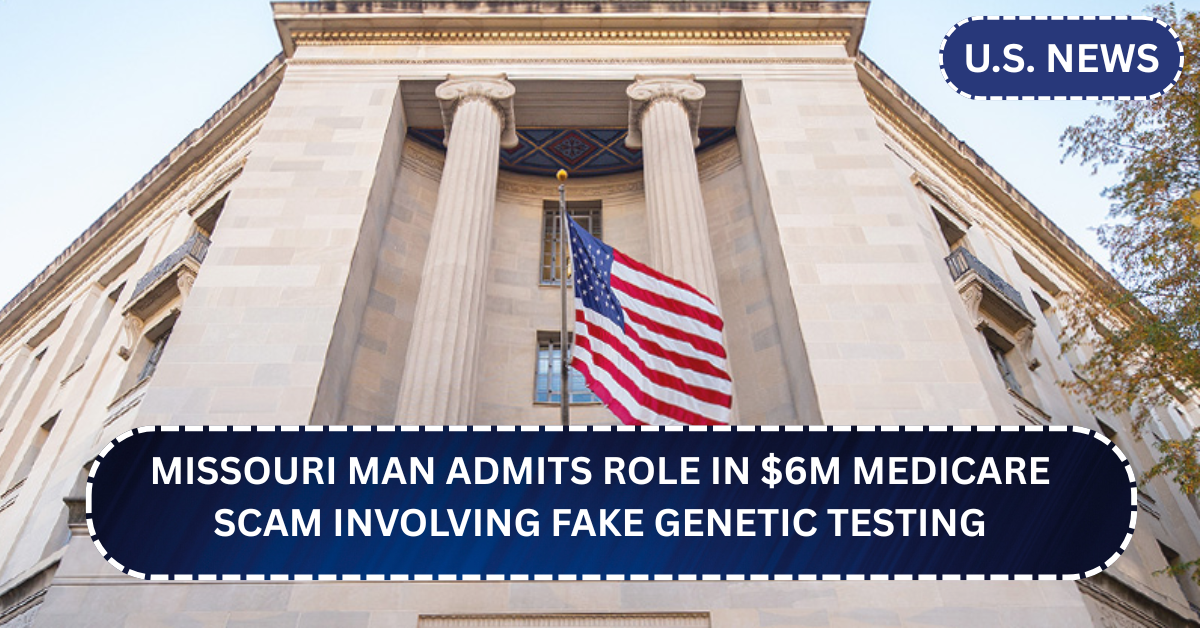A man from Missouri has pleaded guilty to being part of a large Medicare fraud scheme that involved unnecessary genetic testing and cost taxpayers millions of dollars. The case highlights ongoing issues with healthcare fraud in the U.S., especially around medical testing services that target elderly patients.
The individual, identified as 54-year-old Stephen Lucien O’Connor from St. Louis, admitted in court that he played a major role in a scheme that defrauded Medicare of over $6 million. He worked with others to trick elderly patients into taking genetic tests they did not need, and then billed Medicare for those tests.
According to court records, O’Connor acted as a marketer. His job was to recruit elderly Medicare beneficiaries through misleading methods. In many cases, the patients were told that the tests were completely free and covered by Medicare, without being informed that the tests weren’t medically necessary. Some were contacted through telemarketing calls or by visiting senior living communities. Once the patients agreed, their information was used to get doctors’ approvals—often without the doctors ever meeting the patients or knowing their medical history.
After getting these doctor approvals, O’Connor and his partners sent the genetic testing kits to labs. These labs would then bill Medicare thousands of dollars for each test. In return, O’Connor and others involved received kickbacks for every test processed and reimbursed by Medicare. These kickbacks were often disguised as “marketing fees” to make the transactions look legal.
The fraud took place between 2018 and 2021, during which time O’Connor earned a large amount of money from the scheme. The Department of Justice noted that this case is one of many that show how fraudsters take advantage of Medicare’s billing system to make fast money.
In his plea agreement, O’Connor admitted that he knowingly participated in the fraud and understood that the tests were not medically necessary. He now faces up to 10 years in federal prison and a possible fine, along with being ordered to pay back the stolen money. Sentencing is scheduled for a later date.
This case is part of a broader effort by the U.S. government to crack down on healthcare fraud, especially schemes involving genetic testing. Over the past few years, the Department of Justice, in partnership with agencies like the FBI and the Department of Health and Human Services (HHS), has made several arrests and charged many individuals involved in similar scams.
Genetic testing fraud has become a major problem in recent years. With the rise of personalized medicine and advanced diagnostics, more companies are offering DNA-based tests. While these tests can be helpful in some cases, fraudsters are using them as a way to bill Medicare for unnecessary services. Often, the patients have no idea what the test is for or why it’s being done.
Federal officials have warned the public—especially senior citizens—not to share their Medicare numbers or personal health information with anyone offering free testing or medical equipment without consulting their doctor. Scammers often use this information to commit fraud, and victims may not even know their data is being used until months later.
The Department of Justice is urging citizens to report any suspicious activity involving Medicare billing. Whistleblowers and informants have helped uncover many such schemes in the past, and the government continues to encourage people to come forward if they see signs of fraud.
In the case of Stephen O’Connor, the guilty plea is a step forward in recovering the funds and holding people accountable for misusing public healthcare programs. Officials say this kind of fraud not only costs taxpayers but also harms patients who may be subjected to unnecessary medical procedures and stress.
As the investigation continues, more people connected to the scheme could be charged. The government is reviewing other cases tied to similar fraud patterns to determine if more individuals were involved or if this was part of a larger network.
Healthcare fraud remains a serious concern in the U.S., and the government has made it clear that it will continue to pursue those who take advantage of Medicare for personal gain. This case serves as a reminder of how important it is to protect public programs and ensure that they are used only for real medical needs.




